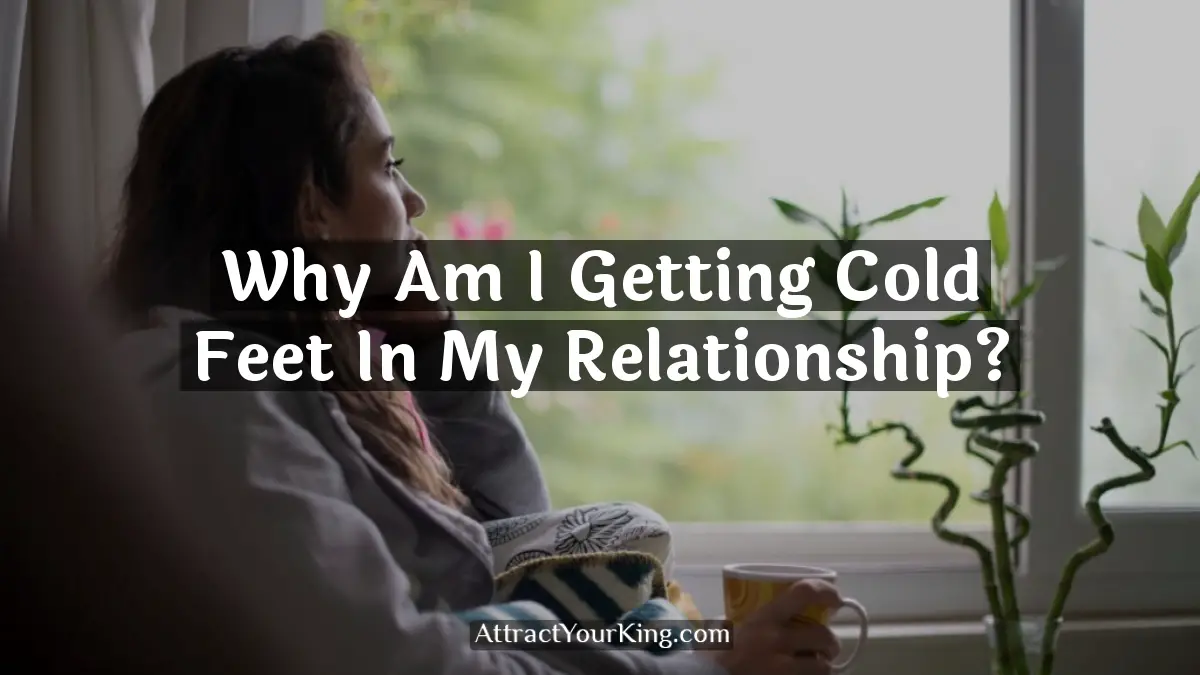Why Am I Getting Cold Feet In My Relationship?
Do you get cold feet in relationships? It’s common. It comes with anxious thoughts, dread and fear. That can be hard to handle. But it might be a sign that something needs to shift for the relationship to move forward. To be more secure and manage these fears, we must understand why they come up and what they’re trying to tell us.
This article will provide insight and tips to help with that:
Identify the Cause
Do you have cold feet in your relationship? It’s essential to work out the cause. Relationship anxiety is normal. Take time to discover the root of your anxiety before taking any action.
Fear of commitment, being overwhelmed, or feeling the relationship is wrong for you, are all possible causes of cold feet. In this article, let’s examine these causes and figure out how to tackle this issue:
- Fear of commitment
- Being overwhelmed
- Feeling the relationship is wrong for you
Fear of Commitment
Cold feet in a relationship could be caused by the fear of commitment. This fear is often due to past relationships that did not go well. It may seem like our freedom, identity, and needs are in danger if we commit to someone.
To fix this, try to improve your self-esteem and confidence. Work on becoming more confident in yourself and believing that you are worthy of a healthy relationship. Realize that relationships can be beneficial and help with personal growth, as long as there is trust and respect. Letting go of any fears or anxieties will prepare you for a successful relationship.
Fear of Intimacy
Fear of intimacy is real and can hurt relationships. It causes people to feel overwhelmed and alone. This fear could be from identity issues, past relationships, or something else. To understand it better, look at its causes.
Insecurity about attachment and closeness can lead to discomfort in relationships. Early life experiences, such as trauma or neglectful parenting, can form feelings that make it hard to feel safe in relationships. Painful memories might cause distress in close moments. Sometimes, difficulty trusting others makes it hard to be close. But this usually only applies to romantic attachments, not friendships or family ties.
To manage these issues, it helps to identify their causes. Mental health professionals knowledgeable in trauma and attachment can help. Also, mindfulness techniques can help regulate emotions instead of using old patterns. This helps individuals deal better when faced with closeness in a relationship.
Fear of the Unknown
Fear of the unknown can lead to cold feet in a relationship. When we decide to be with someone, it means we’re risking potential hurt and disappointment. Staying detached may seem easier, but this isn’t always healthy.
We may ask ourselves questions like “Am I good enough?” or “What if things don’t work out?” These thoughts create uncertainty and can lead to worst case scenarios. It’s easier to stay in our comfort zone than to risk failure.
Remember that growth means challenging ourselves with unfamiliar tasks. This won’t always turn out well, but it will give us valuable insight. Coping strategies like mindfulness and self-compassion can help us manage fear. They can reduce insecurity, so we can navigate relationships without feeling overwhelmed.
Taking Action
Feeling anxious in a relationship is normal, but if it makes you have cold feet, action must be taken. Cold feet may be a sign of greater problems, such as past hurts and trust concerns that must be resolved for the relationship to advance. Fortunately, there are methods to deal with these issues, so don’t be disheartened.
Here are some ideas to help cope with the cold feet in your relationship:
Talk to Your Partner
Talking to your partner is key if you’re feeling unsure. It could be fear of commitment or heartbreak. Expressing yourself lets your partner understand. This deepens the connection and brings understanding.
It might feel intimidating to be honest. Have a conversation about what’s making you anxious. If that’s too hard, consider sending a message or email.
Discuss both sides of the relationship. Talk about nuances like commitment. Boost communication and promote trust.
Check in with yourself often. Establish security before taking action. This brings safety and stability, not uncertainty and insecurity.
Seek Professional Help
Are you having trouble with doubts, fears and anxiety in your relationship? If so, it might be time to get help from a professional. A therapist or counselor can help you see why you have cold feet. It could be because of trust issues or worries about commitment.
With the help of a non-judgmental, experienced person, you can talk about your worries and figure out how to overcome them. This way, your relationship can keep on progressing.
Take Time for Yourself
When facing tough calls or troubles in relationships, it’s good to take some time for yourself. This can reduce hesitation, and give you space to make decisions that you’re okay with. Taking time for yourself might mean going on a walk, talking to a friend or family for support, doing meditation or writing down your thoughts – do activities that give you peace and clarity.
It’ll give you a chance to look at your thinking and feelings from a distance. You can look into your own knowledge and understand why you feel unsure. It also gives you the chance to reach out, like discussing any issues with your partner that make you anxious.
Recognizing your emotions is a great step to take action. Knowing if there are doubts or worries can be really helpful when deciding how to progress in complicated situations. Doing activities like mindful walks or reflective conversations can give you the independence to make hard choices in relationships – even if they end up being tough.
Conclusion
Cold feet in relationships is not rare. It often means there are issues to talk about. Chatting with your partner can help deal with any insecurities or worries. Be honest with yourself too. Consider what’s causing those anxious feelings. With communication, understanding, and consideration, fear will ease up and you can go ahead with your relationship.







